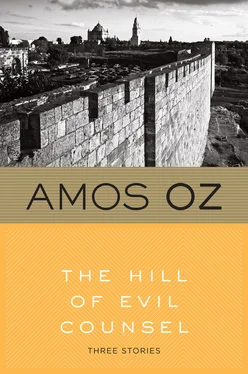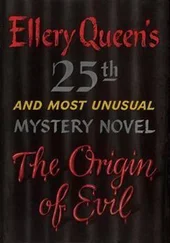"Woman comes from the earth," Dr. Mahdi said in a velvety whisper, in careful English. "Man comes from the rain. And desire comes from the Devil. Look at the Jordan. For thousands of years it has flowed into the Dead Sea, where there is neither fish nor tree, and it never comes out again. There's nothing like that in Persia, Edward, and the moral of the story is: if it's hard to get in, then it's hard to get out."
I would contribute an occasional remark, such as:
"The Land of Israel is full of simple symbols. Not only the Jordan and the Dead Sea — even the malaria and bilharzia here take on a symbolic significance."
"You two use similar words to express totally different sentiments. We all three do, actually."
"Is that really so?" O'Leary would murmur politely. He would refrain from offering an explanation and would deftly change the subject.
***
Antoine ran a private practice in the afternoons and evenings in Katamon, and I had my home clinic in Kerem Avraham. I learned to cultivate polite relations with my neighbors and to be a good listener in hard times. I lost track of the hours 1 spent battling against diphtheria and dysentery. If I was called out at night or over the weekend, when I was busy in my amateur laboratory or listening to music, I never complained. If the children made fun of me in the street for my German ways, I never lost my temper. I fulfilled my obligations, more or less.
Until you and I met in Arza, that is. And until my illness appeared.
So there you have a résumé of the story of my life. Some of it you knew already, and the rest you could probably have deduced, in your usual way, from an analysis of my behavior.
Now I shall return to my observations.
Uri has gone off, probably on instructions from one of Nachtshe's mysterious assistants, to stand on the Kapitanski brothers' roof and keep watch on the Sheikh Jarrah district and the traffic on the Ramallah road. And I, too, am on the lookout, sitting here on my balcony. The details I am amassing will be of no military use: A Jerusalem street vendor, what he sells, how he sells, who buys. My lower-middle-class Eastern European neighbors, and why they quarrel so much among themselves. And what, exactly, their communal ideal is. Their children, what is new about them and what is ancient. And the youths, boys like Nachtshe, Yigal, and Akiva, how, and with what measure of success, they all attempt to dress, talk, and joke on the basis of some abstract archetype from Galilee, from the Palmach, a venerated image of the pioneering hero.
And I myself: apart from my impending death and the code of pains and symptoms, why do I sometimes abhor these brave boys, and secretly call them "Asiatics," and sometimes feel a powerful love for them as though I have an unidentified son among them, a dark-skinned, barefoot, physically tough young man, an expert with machines and weapons, contemptuous of words, contemptuous of me and my worries? I don't know.
More rhetorical questions of an observer: What is regarded as funny here. What is considered embarrassing. What do they talk about and what do they pass over in silence. Who has come to Jerusalem, and where from, what did each of them hope to find here, and what has he actually found. Helena Grill compared to Sonya Litvak. The poet Nehamkin from the electrical and radio repair shop as contrasted with Comrade Lustig. What did they hope to find here and what have they actually found. And I don't exclude myself from the question.
Other questions: What is transitory in Jerusalem, and what is permanent. Why are the colors different here, the autumn colors and the evening colors. And on another level: What are the intentions of the British. Is there going to be a political vacuum. What are the real limits of our power, and how much is simply delusion and arrogance. Is Dr. Mahdi the real, deadly enemy. Is it weakness of will in me that I cannot desire his death, and that I keep trying to think up arguments that might convince him. Everything leads me on to the final point, to the single question: What is going to happen. What lies in store for us.
Because apart from this, what else have I got to think about? The sunsets, perhaps. The embers of my love for you. Doubts and hesitations. Pathetic preparations. Worries.
Mina. Where are you now, tonight. Come back.
These last words may seem to you like a cry for help. That was not what I meant. Forgive me. I'm sorry.
Tuesday, September 9
Dear Mina,
This morning I went to the Jewish Agency to hand in my report on readily available chemicals that may have military uses. On a separate sheet I offered some suggestions, even though it seemed to me that there was nothing new in them, and that any chemist in the university on Mount Scopus would have indicated precisely the same possibilities. My appointment was for nine o'clock, and I was a few minutes early. On the way, a fine drizzle lashed my cheeks. Later, the rain began to beat heavily on the windows of the office. They relieved me of the cardboard folder, thanked me, and then, to my great surprise, led me to Ben-Gurion's office. Somebody, apparently, had exaggerated and told him that there was a side doctor here in Jerusalem who also happened to be an original chemist with daring ideas on the subject of explosives. In brief, he had asked to see me without further delay. Somebody had spun a meaningless myth about me.
Ben-Gurion began with an inquisition. I was asked about my origins, my family, was I related in any way to Nussbaum the well-known educationalist, were my views not close to those of the pacifist Brith Shalom movement. A volcanic man, with gestures reminiscent of Dushkin's, running backward and forward between the window and the bookcase, refusing to waste time on qualifications or reservations. He kept interrupting me almost before I had begun speaking, and goaded me on: The danger was imminent. A critical moment had been reached and we were almost without resources. What we lacked in materials we would make up in spirit and inventiveness. The Jewish genius, he said, would not let us down. We were up to our necks in it. Mr. Ben-Gurion, I tried to say, if you will permit me… But he did not permit me. On the contrary, on the contrary, he said, you will receive everything you need, and you will start work this very night. Make a note of that, Motke. Right. And now, out with it, doctor: tell us what you need.
And I stood there in confusion, with my arms held stiffly at my sides, and explained awkwardly that there appeared to be some misunderstanding. I was not a new Albert Einstein. I was simply a doctor with a modest competence in chemistry, who had volunteered a memorandum and some minor suggestions. The Jewish genius, by all means, but not me. A misunderstanding.
And so I came home, covered with shame and confusion. If only I could live up to their great expectations. Comrade Rubashov writes in the Davar newspaper that we will withstand the coming tests. My heart shuddered at these words. Tests. A real war is coming, we are without resources, and enthusiastic amateurs persist in using words like "tests." No doubt you will be smiling at this point, not at Comrade Rubashov's words but at mine: I wrote "a real war." I can imagine from far away the exhalation of smoke from your nostrils, the twist of your lips.
Last night I heard the drone of engines from the direction of Chancellor Street. Another British convoy on its way northward toward the port of Haifa, perhaps with blacked-out headlights. Is this the beginning of the evacuation? Are we being left to shift for ourselves? What if there is no truth in the image of the fearless fighter from the hills of Galilee? What if regular armies cross the Jordan and the deserts and we fail the test?
This morning from my balcony I watched Sarah Zeldin the kindergarten teacher, a little old Russian woman with a blue apron and a wrinkled face. It was immediately after I got back from the Agency. She was teaching the little children to sing:
Читать дальше











